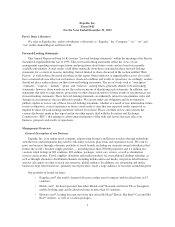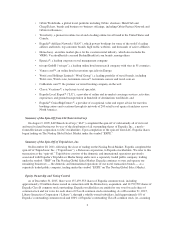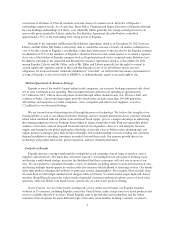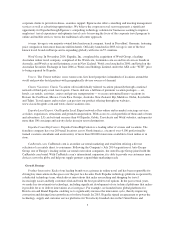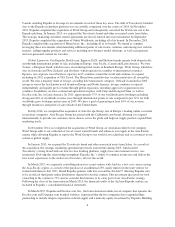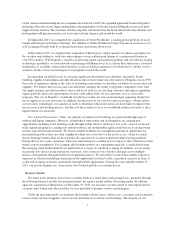Expedia 2015 Annual Report Download - page 15
Download and view the complete annual report
Please find page 15 of the 2015 Expedia annual report below. You can navigate through the pages in the report by either clicking on the pages listed below, or by using the keyword search tool below to find specific information within the annual report.be possible for a third party to copy or otherwise obtain and use our trade secrets or our intellectual property and
proprietary information without authorization which, if discovered, might require the uncertainty of legal action
to correct. In addition, there can be no assurance that others will not independently and lawfully develop
substantially similar properties.
We maintain our trademark portfolio by filing trademark applications with the appropriate international
trademark offices, maintaining appropriate registrations, securing contractual trademark rights when appropriate,
and relying on common law trademark rights when appropriate. We also register copyrights and domain names
as we deem appropriate. We protect our trademarks, copyrights and domain names with an enforcement program
and use of intellectual property licenses. Trademark and intellectual property protection may not be available or
may not be sought, sufficient or effective in every jurisdiction where we operate. Contractual disputes or
limitations may affect the use of trademarks and domain names governed by private contract.
We have considered, and will continue to consider, the appropriateness of filing for patents to protect future
inventions, as circumstances may warrant. However, patents protect only specific inventions and there can be no
assurance that others may not create new products or methods that achieve similar results without infringing
upon patents owned by us.
From time to time, we may be subject to legal proceedings and claims in the ordinary course of our
business, including claims of alleged infringement or infringement by us of the trademarks, copyrights, patents
and other intellectual property rights of third parties. In addition, litigation may be necessary in the future to
enforce our intellectual property rights, protect our trade secrets or determine the validity and scope of
proprietary rights claimed by others. Any such litigation, regardless of outcome or merit, could result in
substantial costs and diversion of management and technical resources, any of which could materially harm our
business.
Regulation
We must comply with laws and regulations relating to the travel industry and the provision of travel
services, including registration in various states as “sellers of travel” and compliance with certain disclosure
requirements and participation in state restitution funds. In addition, our businesses are subject to regulation by
the U.S. Department of Transportation and must comply with various rules and regulations governing the
provision of air transportation, including those relating to advertising and accessibility.
As we continue to expand the reach of our brands into the European, Asia-Pacific and other international
markets, we are increasingly subject to laws and regulations applicable to travel agents or tour operators in those
markets, including, in some countries, pricing display requirements, licensing and registration requirements,
mandatory bonding and travel indemnity fund contributions, industry specific value-added tax regimes and laws
regulating the provision of travel packages. For example, the European Economic Community Council Directive
on Package Travel, Package Holidays and Package Tours imposes various obligations upon marketers of travel
packages, such as disclosure obligations to consumers and liability to consumers for improper performance of the
package, including supplier failure.
Additionally, we are subject to consumer protection, privacy and consumer data, labor, economic and trade
sanction programs, tax, and anti-trust and competition laws and regulations around the world that are not specific
to the travel industry. Some of these laws and regulations have not historically been applied in the context of
online travel companies, so there can be uncertainty regarding how these requirements relate to our various
business models.
Financial Information about Segments and Geographic Areas
We generate our revenue through a diverse customer base, and there is no reliance on a single customer or
small group of customers; no customer represented 10% or more of our total revenue in the periods presented in
this Annual Report on Form 10-K.
11


